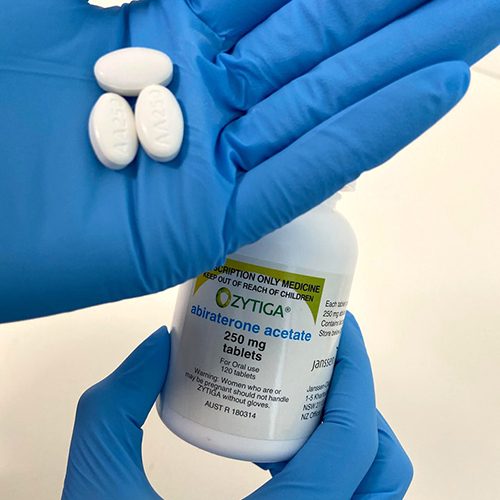The results of a pre-clinical trial by researchers at the University of South Australia show the new formulation improves the effectiveness of the drug Zytiga® (abiraterone acetate) by 40 percent.
Pre-clinical trials are typically done in the laboratory and in living animals. The study appeared in the May 2020 issue of the International Journal of Pharmaceutics.
The effectiveness of many drugs is limited by what researchers call bioavailability, meaning how much of the drug actually gets absorbed into the patient’s blood stream and delivered to the cancer. What limits bioavailability is how water soluble the drug is, so that when the drug is ingested and doesn’t fully dissolve, less of the therapeutic agent actually gets absorbed into the body.
Zytiga is the leading formula to treat prostate cancer but only 10 percent of the dose is absorbed, leaving 90 percent undissolved, and passed through the body. In addition, to achieve even this amount of bioavailability the patient must fast for two hours before taking the drug and another hour after taking it.
The new formulation developed by Professor Clive Prestidge, uses high levels of the drug’s active ingredients, abiraterone acetate, dissolved in a specific oil and encapsulated with in a special type of silica or quartz to form a powder that can be made into tablets or filled into capsules. The formulation as shown in the preclinical trial showed that this increased the bioavailability to 40 percent, which allows a reduction in the dose from 1000mg to 700mg without the need for fasting.
“Based on our knowledge of this drug’s pharmaceutical food effect, we hypothesize its absorption in humans will be extensively improved using this technology,” Professor Prestidge says.
If the team can secure funding, clinical trials in humans could begin within two years
The effectiveness of many drugs is limited by what researchers call bioavailability, meaning how much of the drug actually gets absorbed into the patient’s blood stream and delivered to the cancer. What limits bioavailability is how water soluble the drug is, so that when the drug is ingested and doesn’t fully dissolve, less of the therapeutic agent actually gets absorbed into the body.
Zytiga is the leading formula to treat prostate cancer but only 10 percent of the dose is absorbed, leaving 90 percent undissolved, and passed through the body. In addition, to achieve even this amount of bioavailability the patient must fast for two hours before taking the drug and another hour after taking it.
The new formulation developed by Professor Clive Prestidge, uses high levels of the drug’s active ingredients, abiraterone acetate, dissolved in a specific oil and encapsulated with in a special type of silica or quartz to form a powder that can be made into tablets or filled into capsules. The formulation as shown in the preclinical trial showed that this increased the bioavailability to 40 percent, which allows a reduction in the dose from 1000mg to 700mg without the need for fasting.
“Based on our knowledge of this drug’s pharmaceutical food effect, we hypothesize its absorption in humans will be extensively improved using this technology,” Professor Prestidge says.
If the team can secure funding, clinical trials in humans could begin within two years
Sources: International Journal of Pharmaceutics, May 2020 and University of South Australia press release



No comments:
Post a Comment